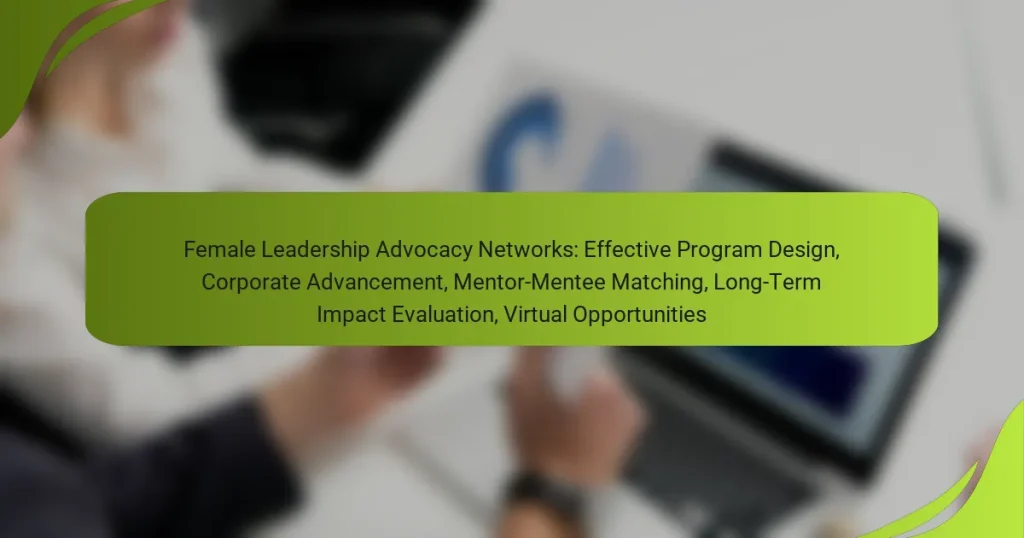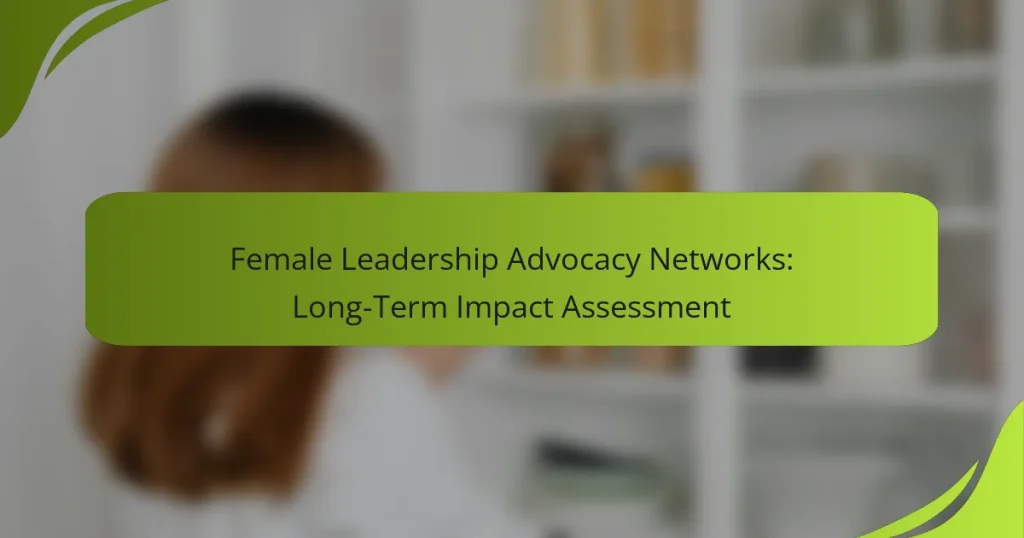Female Leadership Advocacy Networks play a crucial role in enhancing mentorship programs by connecting aspiring women leaders with experienced mentors. These structured support systems are designed to foster professional growth, boost self-confidence, and create valuable networking opportunities, ultimately empowering women to advance in their careers.
Female Leadership Advocacy Networks: Best Practices in STEM Mentorship
Female Leadership Advocacy Networks: Effective Program Design, Corporate Advancement, Mentor-Mentee Matching, Long-Term Impact Evaluation, Virtual Opportunities
Female Leadership Advocacy Networks: Mentor-Mentee Matching Strategies
Female Leadership Advocacy Networks: Virtual Mentorship Opportunities
Female Leadership Advocacy Networks: Long-Term Impact Assessment
Female Leadership Advocacy Networks: Engaging Male Allies in Mentorship
How do Female Leadership Advocacy Networks support mentorship programs?
Female Leadership Advocacy Networks enhance mentorship programs by providing structured support systems that connect aspiring leaders with experienced mentors. These networks focus on fostering professional growth through various initiatives tailored to women’s leadership development.
Networking opportunities
Networking opportunities are crucial for building connections within Female Leadership Advocacy Networks. Members often participate in events such as conferences, seminars, and informal meet-ups, which facilitate relationship-building and collaboration. Engaging with peers and mentors in these settings can lead to valuable partnerships and career advancements.
To maximize networking benefits, consider attending events regularly and actively engaging with others. Follow up with new contacts to maintain relationships and explore potential collaborations.
Skill development workshops
Skill development workshops offered by these networks focus on essential leadership competencies, such as communication, negotiation, and strategic thinking. These workshops often feature interactive sessions led by experienced facilitators who provide practical insights and hands-on exercises.
Participants can expect to gain new skills that are directly applicable to their careers. Look for workshops that align with your professional goals and consider participating in multiple sessions to build a comprehensive skill set.
Access to industry leaders
Access to industry leaders is a significant advantage of Female Leadership Advocacy Networks. Members often have opportunities to engage with successful women in various fields through panel discussions, mentorship pairings, and exclusive events. This exposure can provide invaluable insights into industry trends and best practices.
To leverage this access, prepare thoughtful questions and actively participate in discussions. Building relationships with industry leaders can open doors to new opportunities and mentorship possibilities.
Peer support groups
Peer support groups within these networks create a safe space for women to share experiences, challenges, and successes. These groups foster camaraderie and provide emotional support, which is essential for personal and professional growth. Regular meetings allow members to discuss their progress and seek advice from one another.
Joining a peer support group can enhance accountability and motivation. Consider setting specific goals within the group to track progress and celebrate achievements together.
Resource sharing
Resource sharing is a key component of Female Leadership Advocacy Networks, enabling members to access valuable tools and information. This may include templates, guides, articles, and research relevant to women’s leadership. Such resources can help members navigate their careers more effectively.
To benefit from resource sharing, actively participate in discussions about available materials and contribute your own insights. This collaborative approach enhances the collective knowledge of the network and supports individual growth.
What are the benefits of joining a mentorship program?
Joining a mentorship program offers numerous advantages, including professional growth, enhanced self-assurance, and valuable networking opportunities. These programs connect individuals with experienced mentors who provide guidance tailored to their career aspirations.
Career advancement
Mentorship programs can significantly accelerate career advancement by providing insights into industry trends and best practices. Mentees often gain access to exclusive job opportunities and promotions through their mentor’s network. This support can help navigate career transitions or enhance skills needed for advancement.
For instance, a mentee may receive advice on how to prepare for leadership roles or develop specific competencies that are in high demand. This targeted guidance can lead to faster progression within an organization.
Increased confidence
Participating in a mentorship program can boost self-confidence by offering a safe space for personal and professional development. Mentors encourage mentees to take risks and step outside their comfort zones, which can lead to greater self-assurance in their abilities.
As mentees receive constructive feedback and celebrate their achievements, they often find themselves more willing to pursue challenging projects or leadership positions. This newfound confidence can be a game changer in their professional journey.
Expanded professional network
One of the most significant benefits of mentorship programs is the opportunity to expand one’s professional network. Mentors typically have established connections within their industry, which can open doors for mentees to meet influential professionals.
Networking through mentorship can lead to collaborations, partnerships, or even job offers. Engaging with a mentor’s network can provide access to events, conferences, and other networking opportunities that might not be available otherwise.
Personalized guidance
Mentorship programs offer personalized guidance tailored to the unique needs and goals of each mentee. This individualized approach allows for focused discussions on specific challenges and aspirations, making the mentorship experience more impactful.
Mentees can benefit from tailored advice on career paths, skill development, and industry-specific knowledge. This targeted support helps mentees make informed decisions and develop strategies that align with their personal and professional objectives.
Which organizations lead in female leadership mentorship?
Several organizations are at the forefront of female leadership mentorship, providing resources and support to empower women in their careers. These groups focus on creating networks, offering training, and facilitating mentorship opportunities to help women advance in leadership roles.
Lean In
Lean In is a global community dedicated to empowering women through mentorship and support networks. Founded by Sheryl Sandberg, it encourages women to pursue their ambitions and offers resources like discussion circles and online courses to foster leadership skills.
Participants can engage in local chapters or online platforms, allowing for flexible mentorship opportunities. Lean In’s focus on community building helps women connect with mentors and peers who share similar goals and challenges.
Women in Leadership Nexus
Women in Leadership Nexus (WILN) is a network that aims to elevate women in leadership through mentorship and professional development. It offers workshops, networking events, and mentorship programs tailored to women at various career stages.
WILN emphasizes the importance of building relationships with experienced leaders who can provide guidance and support. Their programs often include one-on-one mentorship matches, helping women navigate their career paths effectively.
National Women’s Business Council
The National Women’s Business Council (NWBC) serves as an advisory council to the U.S. government, focusing on women entrepreneurs and business leaders. It conducts research and provides recommendations to improve women’s access to mentorship and business resources.
NWBC also hosts events and forums where women can connect with mentors and industry leaders, fostering a supportive environment for female entrepreneurs. Their initiatives often highlight the importance of mentorship in overcoming barriers to success in business.
Girlboss Foundation
The Girlboss Foundation supports women entrepreneurs and creatives through grants and mentorship opportunities. It aims to empower the next generation of female leaders by providing financial support and access to experienced mentors in various fields.
Through its grant programs, the foundation encourages women to pursue their passions while connecting them with mentors who can offer valuable insights and guidance. This dual approach helps cultivate a strong network of female leaders who can inspire and support one another.
What criteria should be considered when choosing a mentorship program?
When selecting a mentorship program, consider factors such as program structure, mentor qualifications, participant testimonials, and alignment with your career goals. These criteria help ensure that the program meets your needs and fosters meaningful connections.
Program structure
The program structure outlines how the mentorship will be organized, including the duration, frequency of meetings, and format (in-person or virtual). A well-defined structure can enhance accountability and ensure that both mentors and mentees have clear expectations.
Look for programs that offer a mix of one-on-one sessions, group activities, and networking opportunities. This variety can enrich the mentorship experience and provide diverse perspectives.
Mentor qualifications
Mentor qualifications are crucial for a successful mentorship experience. Consider mentors’ professional backgrounds, areas of expertise, and their experience in mentoring others. A mentor with relevant industry experience can provide valuable insights and guidance.
Additionally, assess the mentor’s communication style and availability. A good mentor should be approachable and willing to invest time in your development.
Participant testimonials
Participant testimonials offer insights into the effectiveness of a mentorship program. Look for reviews or feedback from previous mentees to gauge their experiences and outcomes. Positive testimonials can indicate a program’s strengths and the potential for personal growth.
Consider reaching out to past participants for direct conversations. Their firsthand accounts can provide a clearer picture of what to expect and help you make an informed decision.
Alignment with career goals
Ensuring that a mentorship program aligns with your career goals is essential for maximizing its benefits. Identify your professional aspirations and seek programs that focus on your specific industry or skill set. This alignment will make the mentorship more relevant and impactful.
Additionally, clarify your goals with potential mentors. Open discussions about your objectives can help both parties tailor the mentorship experience to meet your needs effectively.
How do mentorship programs impact female leadership in the workplace?
Mentorship programs significantly enhance female leadership by providing guidance, support, and networking opportunities. These programs help women navigate their careers, build confidence, and develop essential skills, ultimately leading to increased representation in leadership roles.
Increased representation
Mentorship programs contribute to increased representation of women in leadership positions by connecting them with experienced mentors who can advocate for their advancement. This support often leads to greater visibility within organizations, helping women to be considered for promotions and leadership roles.
Furthermore, mentorship fosters a culture of inclusion, encouraging organizations to prioritize diversity in their leadership teams. Companies that actively promote mentorship initiatives often see a higher percentage of women in executive roles, which can range from 25% to 50% depending on the industry.
To maximize the impact of mentorship on representation, organizations should implement structured programs that pair emerging female leaders with mentors who have a track record of success. Regular check-ins and feedback sessions can enhance the effectiveness of these relationships, ensuring that mentees receive the guidance they need to thrive.






